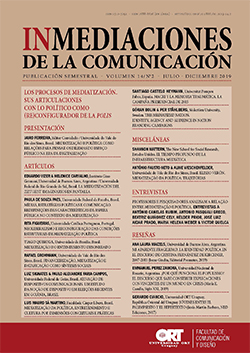The mediatized nation. Identity, agency and audience in nation branding campaigns
DOI:
https://doi.org/10.18861/ic.2019.14.2.2926Keywords:
Nation branding, mediatization, identity, audience, agencyAbstract
Nation branding is a dynamic and rapidly developing practice and a subprocess under the wider process of mediatization for promoting or readjusting images of a nation-state for tourists or investors. Especially young nation states have a felt need to build new images of themselves in the eyes of the surrounding world, but since these
nation states also have a short history of sovereignty, they simultaneously need to build the social solidarity and community inwards, to form the basis needed for the building of a nation. This article takes its departure in this tension and addresses three themes –agency, audience and identity– that we consider needs further theorizing due to the fact that the practice is yet trying to find its form. These themes are discussed in relation to the branding efforts in the new Eastern European state of Ukraine over the past decade. It is concluded that the nation branding campaigns are today orchestrated also by domestic PR agencies (to the contrary of the previous dominance of British agencies), that the domestic audience is taken into consideration in other ways than in previous branding campaigns, and that the questions of identity construction is more complex than what is previously accounted for. The Ukrainian case thus illustrates the mediatization of national symbols in contemporary society.
Downloads
References
Adams, S. & Greutzner Robins, A. (eds) (2000). Gendering landscape art. Manchester: Manchester University Press.
Anderson, B. (1991). Imagined communities: reflections on the origin and spread of nationalism. London: Verso.
Anholt, S. (2007). Competitive identity: the new brand management for nations, cities, and regions. New York: Palgrave Macmillan.
Aronczyk, M. (2007). New and improved nations: branding national identity. In Calhoun, C. & Sennett, R. (eds). Practising cultures (pp. 105-128). London: Routledge.
Aronczyk, M. (2008). ‘Living the brand’: nationality, globality and the identity strategies of branding consultants. International Journal of Communication, 2, 41-65.
Aronczyk, M. (2013). Branding the nation. the global business of national identity. Oxford: Oxford University Press.
Bezpiatchuk, Z. (December, 2011). Branding Ukraine: lip-synching a happy tune. The Ukrainian Week, 20. Avaiable on: http://ukrainianweek.com/Society/38090.
Bohlman, P.V. (2004). The Music of European Nationalism. Cultural Identity and Modern History. Santa Barbara: ABC Clio.
Bolin, G. (2002). Nationsmarknadsföring. Eurovisionsschlagerfestivalen som modern världsutställning. In Ericson, S. (ed.). Hello Europe! Tallinn Calling! Eurovision Song Contest 2002 som mediehändelse (pp. 33-42). Huddinge: MKV.
Bolin, G. (2006a). Visions of Europe. Cultural Technologies of Nation States. International Journal of Cultural Studies, 9(2), 189-206.
Bolin, G. (2006b). Electronic Geographies. Media Landscapes as Technological and Symbolic Environments. In Falkheimer, J. & Jansson, A. (eds). Geographies
of Communication. The Spatial Turn in Media Studies (pp. 67-86). Göteborg:
Nordicom.
Bolin, G. & Hepp, A. (2017). The complexity of mediatization: charting the road ahead. In Driessens, O., Bolin, G., Hepp, A. & Hjarvard, S. (eds), Dynamics of mediatization: institutional change and everyday transformations in a digital age (pp. 315-332). London: Palgrave.
Bolin, G. & Ståhlberg, P. (2010). Between community and commodity. nationalism and nation branding. In Roosvall, A. & Salovaara Moring, I. (eds). Communicating the Nation. National Topographies of Global Media Landscapes (pp. 79-101). Göteborg: Nordicom.
Bolin, G. & Ståhlberg, P. (2015). Mediating the Nation State: The Role of “The Media” in Nation Branding Campaigns. International Journal of Communication, 9, 3065–3083.
Bourdieu, P. (1983/1993). The Field of Cultural Production, or: The Economic World Reversed. In: Bourdieu, P. (1993). The field of cultural production. essays on art and literature (pp. 29-73). Cambridge: Polity.
Calhoun, C. (2007). Nationalism and cultures of democracy. Public Culture, 19(1), 151-173.
Davies, A. (2013). Promotional cultures. Polity: Cambridge.
Geertz, C. (1973). The interpretation of cultures. New York: Basic Books.
Graan, A. (2013). Counterfeiting the Nation? Skopje 2014 and the Politics of Nation Branding in Macedonia. Cultural Anthropology, 28(1), 161-179.
Hepp, A. (2013). Cultures of mediatization. Cambridge: Polity Press.
Hepp, A. & Krotz, F. (eds.) (2014). Mediatized iFirst, worlds: culture and society in a media age. Houndmills: Palgrave MacMillan
Hjarvard, S. (2013). The mediatization of culture and society. London: Routledge.
Hobsbawm, E. & Ranger, T. (eds) (1983). The invention of tradition. Cambridge: Cambridge University Press.
Jansen, S. C. (2008). Designer Nations: neo-liberal nation branding – brand Estonia. Social Identities, 14(1), 121-142.
Jordan, P. (2011). The Eurovision Song Contest: Nation Branding and Nation Building in Estonia and Ukraine. PhD thesis, University of Glasgow, Glasgow, Scotland.
Jordan, P. (2013). Nation Branding: a tool for nationalism? Journal of Baltic Studies, 1-13.
Kaneva, N. (2011). Nation Branding: toward an agenda for critical research. International Journal of Communication, 5, 117-141.
Kaneva, N. (ed.) (2012). Branding post-communist nations. marketizing national identities in the ‘New’ Europe. New York & London: Routledge.
Kaneva, N. & Popescu, D. (2011). National identity lite: nation branding in post-communist Bulgaria and Romania. International Journal of Cultural Studies, 14(2), 191–207.
Lundby, K. (ed.) (2014). Mediatization of communication. Berlin: de Gruyter.
Lury, C. (2004). Brands. The logos of the global economy. London & New York: Routledge. Myroshnychenko, V. (Jun., 2006).
‘Брендстраныкакдвигательэкономического
развития’ (The country brand as a driver of economic growth). Комп&ньоН
(Companion), 24(488), 16–22.
Olins, W. (2003). On brands. London: Thames & Hudson.
Ståhlberg, P. & Bolin, G. (2016). Having a soul or chosing a face? Nation branding and the concept of “identity”. Social Identities, 22(3), 274-290.
Valaskivi, K. (2013). A Brand new future? Cool Japan and the social imagenary of the branded nation. Japan Forum, 25(4), 485-504.
Varga, S. (2013). The politics of nation branding: collective identity and public sphere in the neoliberal state. Philosophy and Social Criticism, OnlineFirst, DOI:10.1177/0191453713494969.
Volcic, Z. & Andrejevic, M. (2011). Nation branding in the era of commercial nationalism. International Journal of Communication, 5, 598-618.
Wolczuk, K. (2000). History, Europe and the ‘national idea’: the ‘official’ narrative of national identity in Ukraine. Nationalities Papers, 28(4), 671-694.





